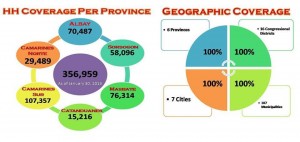Pantawid Pamilyang Pilipino Program
by Agnes Mayor | March 7, 2013 10:58 am
 [1]What is the Pantawid Pamilyang Pilipino Program?
[1]What is the Pantawid Pamilyang Pilipino Program?
• Pantawid Pamilyang Pilipino Program is a conditional cash transfer (CCT) program that provides cash grants to poor households with children 0-14 years old and/or pregnant mothers, provided that they comply with the conditions set by the program
• Objectives:
- social assistance– provides conditional cash assistance to the poor to alleviate their immediate needs (short term poverty alleviation); and
- social development– aims to break the intergenerational poverty cycle through investments in human capital.
Who are qualified for Pantawid Pamilya?
- A household may qualify for Pantawid Pamilya as a beneficiary if it satisfies two (2) criteria:
1.) At the time of the survey, the household must be classified as poor, based on the National Household Targeting System for Poverty Reduction (NHTS-PR) and
2.) Have a pregnant woman and/or children 0-14 years old as household member(s).
- Thus, being included in the NHTS-PR list of poor households does not automatically qualify a household for Pantawid Pamilya. In the same manner, not all households with a pregnant woman or young children as members will qualify for the program.
What are the conditions of the Pantawid Pamilya?
- Health and nutrition conditions require periodic checkups, growth monitoring, and vaccinations for children 0-5 years of age; twice a year intake of de-worming pills for children 6-14 years old, pre- and post-natal care for pregnant women and attendance of parents in family development sessions where responsible parenthood is discussed.
- Education conditions include day-care and school enrollment, attendance equivalent to 85 percent of school days for children 3 – 14 years old.
- Both conditions are meant to improve the poor household’s economic prospects to help them move out of poverty.
What does the program offer to households?
- Households that comply with all the health conditions will receive P500 per month,
- Households that comply with the education conditions will receive P300 per child per month. Up to three qualified children can benefit from the education grant. Education grants will only be given during months with classes.
• The cash grants, which are given every two months, will be received directly by household beneficiaries through their Land Bank cash cards or through over-the-counter payments at Landbank branches. The Land Bank also utilizes other modes to distribute the cash in hard to-reach areas such as off-site payment, and G-cash remit. Other payment schemes are continuously being explored, also in collaboration with the private sector,
Is Pantawid Pamilya program dole-out?
• No. Conditional cash grants are given only to households which comply with the program conditions. Beneficiaries sign an Oath of Commitment, thereby establishing a “social contract”, where they agree to take a number of concrete steps to improve their lives and those of their children.
• Beneficiaries who fail to comply with certain conditions will not receive the benefit corresponding to the conditions and are given reminders. Failure to comply for a third time will lead to suspension of cash grants, in which beneficiaries are given 12 months to appeal and comply. Failure to comply for fourth time will render the beneficiary ineligible and will be given notice that they will be delisted.
Does Pantawid Pamilya encourage indolence/mendicancy among its beneficiaries?
• No. First, the conditional cash grant only augments the household income and assists parents to support their household’s basic needs. The amount is not enough to support a family and will therefore not lead productive members of the household to stop working or stop looking for work. Second, this assistance is only temporary. Beneficiaries are expected to graduate from the program after 5 years.
• The program has family development sessions where beneficiaries are taught about responsible parenthood (parenting duties, obligations) and how to supplement their household’s income through backyard gardening, handicraft making, etc.
• The CCT grant is small by design so as not to discourage poor people from seeking their own way out of poverty. What the grant does, though, is encourage people to keep their children in school and seek proper health care so that they can lift themselves out of poverty and gradually break the intergenerational transmission of poverty.
What are the systems set up by DSWD to make Pantawid Pamilya work?
• In all Pantawid Pamilya areas, the following systems are established and running effectively:
a. Compliance Verification System (CVS): reporting of health facility usage and school attendance to verify that children 0 -14 are complying with the conditions for the grants. The data generated by the CVS is the basis of the amount of cash grants a household can receive.
b. Beneficiary Update system (BUS): regular reporting from beneficiaries on changes in household information such as new school enrollment or changes in health centers and other information that could affect the amount of cash grants they are entitled to receive. Updating information in the database is important as update errors may result in errors in compliance verification and consequently, deduction of grants.
c. Grievance Redress System (GRS): reporting and addressing of grievances and complaints from beneficiaries and non-beneficiaries. Complaints are addressed and solved at the central, regional, provincial and municipality levels depending on the type of complaint.
 [2]
[2]
- [Image]: https://fo5.dswd.gov.ph/wp-content/uploads/2013/03/logo.png
- [Image]: https://fo5.dswd.gov.ph/wp-content/uploads/2013/03/coverage3.jpg
Source URL: https://fo5.dswd.gov.ph/programs-services/core-programs/pantawid-pamilyang-pilipino-program/